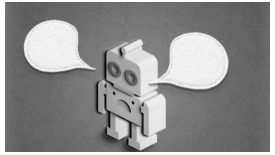The word yet in It's not omniscient or smart enough to repla...
Read Text I and answer the question.
Text I
Why We're Obsessed With the Mind-Blowing ChatGPT AI Chatbot
Stephen Shankland
Feb. 19, 2023 5:00 a.m. PT

This artificial intelligence bot can answer questions, write essays, summarize documents and write software. But deep down, it doesn't know what's true.
Even if you aren't into artificial intelligence, it's time to pay attention to ChatGPT, because this one is a big deal.
The tool, from a power player in artificial intelligence called OpenAI, lets you type natural-language prompts. ChatGPT then offers conversational, if somewhat stilted, responses. The bot remembers the thread of your dialogue, using previous questions and answers to inform its next responses. It derives its answers from huge volumes of information on the internet.
ChatGPT is a big deal. The tool seems pretty knowledgeable in areas where there's good training data for it to learn from. It's not omniscient or smart enough to replace all humans yet, but it can be creative, and its answers can sound downright authoritative. A few days after its launch, more than a million people were trying out ChatGPT.
But be careful, OpenAI warns. ChatGPT has all kinds of potential pitfalls, some easy to spot and some more subtle.
“It's a mistake to be relying on it for anything important right now,” OpenAI Chief Executive Sam Altman tweeted. “We have lots of work to do on robustness and truthfulness.” […]
What is ChatGPT?
ChatGPT is an AI chatbot system that OpenAI released in November to show off and test what a very large, powerful AI system can accomplish. You can ask it countless questions and often will get an answer that's useful.
For example, you can ask it encyclopedia questions like, “Explain Newton's laws of motion.” You can tell it, "Write me a poem," and when it does, say, "Now make it more exciting." You ask it to write a computer program that'll show you all the different ways you can arrange the letters of a word.
Here's the catch: ChatGPT doesn't exactly know anything. It's an AI that's trained to recognize patterns in vast swaths of text harvested from the internet, then further trained with human assistance to deliver more useful, better dialog. The answers you get may sound plausible and even authoritative, but they might well be entirely wrong, as OpenAI warns.
Adapted from: https://www.cnet.com/tech/computing/why-were-all-obsessedwith-the-mind-blowing-chatgpt-ai-chatbot/
- Gabarito Comentado (1)
- Aulas (3)
- Comentários (4)
- Estatísticas
- Cadernos
- Criar anotações
- Notificar Erro
Gabarito comentado
Confira o gabarito comentado por um dos nossos professores
Alternativa A.
CORRETA. Neste contexto, "yet" indica que até o momento presente, o ChatGPT ainda não é suficientemente inteligente ou onisciente para substituir completamente os humanos. Portanto, "so far" (em português, “até agora") é a expressão que melhor reflete esse significado.
Alternativa B.
ERRADA. “Since then", em português “desde então", implica um período de tempo que começa num ponto específico do passado até ao presente. No contexto da frase, “desde então" não transmite o significado pretendido de o ChatGPT ainda não ser capaz de substituir completamente os humanos.
Alternativa C.
ERRADA. “Right away" não se enquadra porque significa imediatamente ou sem demora. Isso não transmite a ideia de que o ChatGPT não seja atualmente capaz de substituir todos os humanos.
Alternativa D.
ERRADA. A expressão “hardly ever" não transmite a noção de que o ChatGPT possa eventualmente substituir os humanos, porque ela significa quase nunca ou muito raramente.
Alternativa E.
ERRADA. “From now on", em português “de agora em diante" ou “a partir de agora", não se alinha com a ideia de que o ChatGPT ainda não é capaz de substituir completamente os humanos.
GABARITO DO PROFESSOR: LETRA A.
Clique para visualizar este gabarito
Visualize o gabarito desta questão clicando no botão abaixo
Comentários
Veja os comentários dos nossos alunos
A palavra "yet" neste contexto indica que algo ainda não aconteceu até o momento presente, o que é semelhante em significado a "so far" (até agora). Portanto, a alternativa correta é a letra A.
B. "since then" - Essa expressão se refere a algo que aconteceu a partir de um momento específico no passado.
C. "right away" - Essa expressão significa "imediatamente" ou "imediatamente depois". Não se relaciona diretamente com a ideia de algo que ainda não ocorreu até o momento presente, como é o caso da palavra "yet".
D. "hardly ever" - Essa expressão significa "quase nunca" ou "raramente". Não transmite a ideia de algo que ainda não ocorreu, mas sim de algo que ocorre muito pouco.
E. "from now on" - Essa expressão se refere a algo que acontecerá a partir deste ponto no tempo em diante. Não se encaixa no contexto de algo que ainda não ocorreu até o momento presente.
Obrigada Felipe, você é um amigo
Você arrasa Felipe!
a-
the constituent segment brings forth a meaningful unit of present time, which could be taken to address a factual occurrence that is still taking place at the time of our present reality.
Clique para visualizar este comentário
Visualize os comentários desta questão clicando no botão abaixo